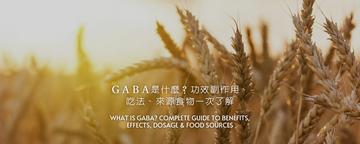失眠、壓力大、總是睡不好的你,是否經常羨慕別人躺下就能安穩入睡?近年來, GABA 這個營養素逐漸受到注目,被譽為「睡眠大師」。但 GABA 究竟是什麼?為什麼可以幫助入睡?什麼人適合補充?本篇將為你詳細解析所有關於 GABA 的重要知識。
目錄
1. GABA 是什麼?
2. GABA 的4大功效與益處
3. 富含 GABA 的天然食物
4. 誰適合吃GABA?
5. GABA 的副作用、不適合補充的族群
6. GABA 最佳食用時間
7. GABA 攝取量建議
GABA 是什麼?
GABA 全名為 Gamma-Aminobutyric Acid(γ-胺基丁酸),是一種天然存在於人體中的胺基酸,也是重要的神經傳導物質,在體內扮演「煞車」的角色,能夠抑制神經細胞過度興奮,平穩情緒,幫助身心達到放鬆狀態。
GABA 的 4 大功效與益處
現在 GABA 彷彿變成放鬆減壓的代名詞,因為 GABA 目前被認為有以下四大的好處:
1. 改善睡眠品質
包含幫助入睡、延長深度睡眠時間、減少半夜醒來次數等等,助一覺好眠。
2. 紓解壓力、抗憂鬱
能鎮靜思慮、穩定情緒,進而減輕焦慮、幫助放鬆。
3. 提升專注、認知能力
改善日間精神狀態,增強記憶力後工作效率,提高學習專注度。
4. 調節生理機能、促進新陳代謝
提升身體代謝機能,維持生理正常運作。
含有 GABA 的天然食物有哪些?
其實我們的身體本身就能合成 GABA 來維持生理平衡,但由於生活壓力大、作息不規律,現代人體內自行生成的 GABA 濃度往往不夠用。此時,我們可以透過飲食來補充 GABA,幫助身心放鬆。
GABA 廣泛存在於各類食物,尤其是植物中的含量比動物性食材更多!最常見的有以下食物:
1. 根莖穀物類:胚芽米、豆類、玉米、大麥、糙米、各類穀物
2. 蔬菜類:番茄、菠菜、山藥、馬鈴薯、蕃薯、羽衣甘藍、栗子
3. 發酵食品:泡菜、味噌、納豆、醃漬蔬菜
誰適合補充 GABA?
1. 工作壓力大的上班族:
長期處於高壓環境、需要提高工作效率,或經常需要加班熬夜的職場工作者。
2. 學習壓力大的學生:
面臨重要考試、需要長時間保持專注力,或因學習壓力導致作息不規律的莘莘學子。
3. 睡眠品質不佳者:
有入睡困難、睡眠淺眠,或容易半夜驚醒等睡眠困擾的人。
4. 心情起伏大者:
不論是容易緊張、心浮氣躁,或是常低落、提不起勁的人,都是和適度補充 GABA。
吃 GABA 有副作用嗎?哪些族群別吃GABA?
GABA 的安全性高,屬於天然的氨基酸,目前還未證實有特定不良反應。
不過孕婦與哺乳婦女、服用特定藥物,如降血壓藥物者,不建議自行補充 GABA,應先向醫師諮詢。
GABA 什麼時候吃最好?
對於想要改善睡眠品質的人來說,建議在睡前1-2小時,或是晚餐後服用 GABA。不過因每個人的作息不同,你可以根據自己的生活型態調整服用時間。
特別提醒,如果即將面對重要會議、考試等需要高度專注的場合,也可以提前服用 GABA來幫助心情平穩。
GABA 建議攝取量?
健康成人每日 GABA 的建議攝取量在 250-500 毫克之間,請注意不要超過每日 500 毫克的安全上限。
為了達到更好的效果,建議可以選擇添加鈣、鎂、色胺酸或香蜂草萃取物等複方成分的產品,這些成分能與 GABA 產生加乘作用,幫助你更好的入眠與放鬆!
Wave 放鬆氣泡飲,為全台首創添加 GABA、色胺酸、香蜂草草本萃取物的氣泡飲品。不論是飯後小酌,或和朋友派對暢飲,都可以好好享受真正無負擔的「心情放輕鬆」!
What is GABA? Complete Guide to Benefits, Effects, Dosage & Food Sources (2024)
Do you often lie in bed envying those who can fall asleep instantly? If you're struggling with sleepless nights and stress, you might want to learn about GABA - a natural compound nicknamed the "Sleep Master." But what exactly is GABA? How does it help with sleep? Who should take it? Let's dive into everything you need to know about GABA.
Table of Contents
1. What is GABA?
2. 4 Key Benefits of GABA
3. Natural Food Sources of GABA
4. Who Should Take GABA?
5. Side Effects and Precautions
6. Best Time to Take GABA
7. Recommended GABA Dosage
What is GABA?
GABA (Gamma-Aminobutyric Acid) is a naturally occurring amino acid in the human body and serves as a crucial neurotransmitter. Think of it as your brain's natural "brake pedal" - it helps inhibit excessive neural activity, calms your mind, and promotes relaxation.
4 Key Benefits of GABA
GABA has become synonymous with relaxation and stress relief, offering four primary benefits:
1. Improved Sleep Quality
GABA helps you fall asleep faster, extends deep sleep duration, and reduces nighttime wake-ups, contributing to more restful sleep.
2. Stress Relief and Mood Support
It helps quiet racing thoughts, stabilize emotions, and reduce anxiety, promoting a sense of calm.
3. Enhanced Focus and Cognitive Function
GABA can improve daytime alertness, boost memory performance, and enhance concentration for better productivity.
4. Physiological Balance and Metabolism
It helps regulate bodily functions and supports healthy metabolic processes.
Natural Food Sources of GABA
While our bodies produce GABA naturally, modern stress and irregular lifestyles can deplete our GABA levels. Fortunately, we can supplement through diet. GABA is abundant in various foods, with plant sources containing significantly higher levels than animal sources.
1. Whole Grains and Roots: germinated rice, legumes, corn, barley, brown rice (especially sprouted), various grains
2. Vegetables: tomatoes, spinach, yams, potatoes, sweet potatoes, kale, chestnuts
3. Fermented Foods: kimchi, miso, natto, fermented vegetables
Who Should Take GABA?
1. High-Stress Professionals:
Those working in demanding environments, needing enhanced productivity, or regularly working overtime.
2. Students Under Academic Pressure:
Individuals facing important exams, requiring sustained focus, or dealing with irregular study schedules.
3. People with Sleep Issues:
Those experiencing difficulty falling asleep, light sleep, or frequent night wakings.
4. Mood Support Seekers:
People dealing with mood fluctuations, anxiety, or low energy levels.
Are There Side Effects? Who Should Avoid GABA?
GABA is generally safe as it's a natural amino acid, with no significant documented side effects.
However, pregnant women, nursing mothers, and those taking specific medications (particularly blood pressure medication) should consult their healthcare provider before supplementing with GABA.
When is the Best Time to Take GABA?
For sleep improvement, take GABA 1-2 hours before bedtime or after dinner. However, timing can be adjusted based on your personal schedule and needs.
Notably, GABA can also be taken before important meetings, exams, or other high-stress situations to help maintain composure and focus.
What's the Recommended GABA Dosage?
For healthy adults, the recommended daily GABA intake ranges from 250-500 milligrams, with 500mg being the suggested upper limit.
For optimal results, consider products that combine GABA with complementary ingredients like calcium, magnesium, L-theanine, or lemon balm extract. These compounds can work synergistically with GABA to enhance its relaxation and sleep-promoting effects!
Wave Relaxation Drink is Taiwan's first beverage featuring GABA, L-theanine, and lemon balm extracts. Whether you're unwinding after dinner or socializing with friends, it offers a guilt-free way to "lighten up your mood!"


